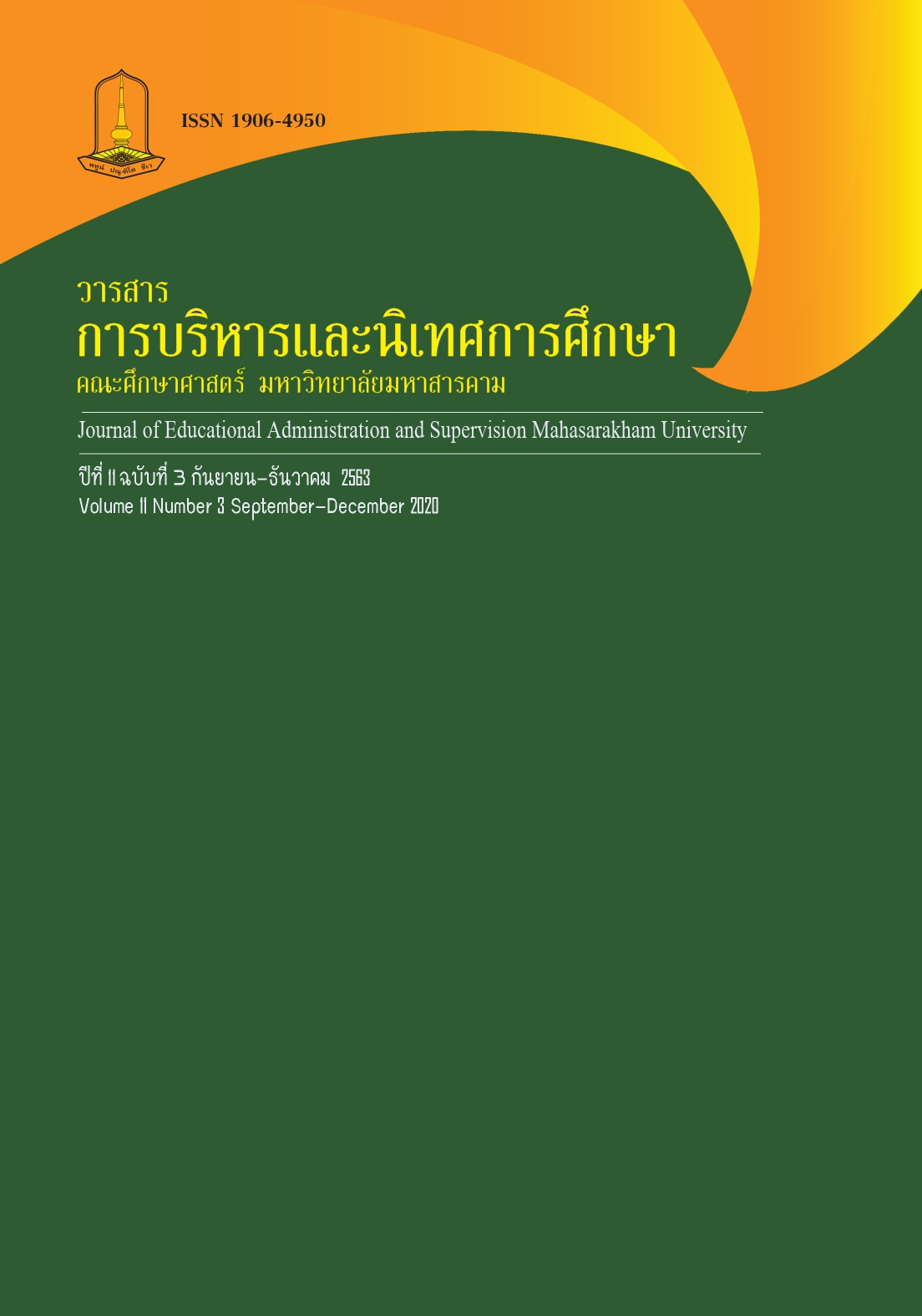Leadership of School Administrators in Education 4.0 That Affects Being a Healthy School under Loei Primary office Education Service Areas
Main Article Content
Abstract
The purposes of his research were: 1) to study the level of leadership of school administrators in education 4.0, 2) to study the level of creative a healthy school, 3) to investigate the relationship leadership of school administrators in education 4.0 and of healthy school, and 4) set predictive equations of leadership of school administrators in education 4.0 under Loei Primary Office Education Service Areas.The Samples consisted of teachers and Personnel in the school to 352 people obtained by stratified random sampling.The research instrument was: 5-level-rating scale questionnaire of the leadership of school administrators in education 4.0 with the discrimination of .430-.980 and the reliability of .98 and the creative a healthy school with the discrimination of .466-.858 and the reliability of .98.The data were analyzed for frequency, percentage, mean, standard deviation, Pearson’s product moment correlation coefficient and the stepwise multiple regression. The result of the research shows that: 1) Creative leadership of school administrators it is at the high level. 2) A healthy school it is at the high level. 3) The creative leadership of school administrators in education 4.0 have a positive relationship with a healthy school. under Loei Primary Office Education Service Areas. And 4) The visionary change leader factors, Factors of Creative innovation, creating work cooperation factor, Factors of Leadership skills using digital, and Consideration of individuality factor. It is a predictive variable that can predict the healthy school under Loei Primary Office Education Service Areas, can predict 45.80%.
Downloads
Article Details
References
เกรียงวุธ นีละคุปต์. (2560). “การศึกษาแนวทางการพัฒนาโรงเรียนสุขภาวะ”. วารสารศาสตร์การศึกษาและการพัฒนามนุษย์, 1(2): 1-13.
ดวงดาว แช่มชื่น. (2560). การพัฒนาแนวทางการดำเนินงานโรงเรียนสุขภาวะสำหรับสถานศึกษา สังกัดสำนักงานเขตพื้นที่การศึกษาประถมศึกษาอุดร เขต 1. วิทยานิพนธ์ปริญญาครุศาสตรมหาบัณฑิต สาขาวิชาการบริหารการศึกษา มหาวิทยาลัยมหาสารคาม.
ถวิล อรัญเวศ. (2560). คุณลักษณะของนักบริหารยุคไทยแลนด์ 4.0. สืบค้นเมื่อวันที่ 15 กันยายน 2562. จาก http://www.obec.go.th/news/82582.
นุช สัทธาฉัตรมงคล. (2559). “ผู้นำการเปลี่ยนแปลงในยุคโลกาภิวัฒน์สู่การพัฒนาอย่างยั่งยืน”. วารสารธุรกิจปริทัศน์., 8(1): 167-182.
ประวิต เอราวรรณ์. (2547). การสังเคราะห์โครงการเกี่ยวกับการพัฒนาระบบบริหารจัดการและการจัดการกิจกรรมการเรียนด้านสุขภาวะในโรงเรียน. พิมพ์ครั้งที่ 1 กรุงเทพฯ: สำนักงานกองทุนสนับสนุนการสร้างเสริมสุขภาพ.
พระมหาอุดร อุตฺตโร และทองดี ศรีตระการ. (2562). “ภาวะผู้นำ : การบริหารวิชาการสู่การศึกษายุค 4.0”. วารสารปัญญาปณิธาน, 3(1): 42-53.
ไพฑูรย์ สินลารัตน์. (2555). ออกแบบผู้นำการศึกษาใหม่: ผู้นำเชิงสร้างสรรค์และผลิตภาพ. กรุงเทพฯ:
สุนทร วัชรกิจ. (2562). “ภาวะผู้นำที่ดีในยุคไทยแลนด์ 4.0”. Veridian E-Journal Silpakorn University, 12(4): 119-139.
สำนักงานกองทุนสนับสนุนการสร้างเสริมสุขภาพ หรือ สสส. (2560). การส่งเสริมสุขภาพจิต แนวคิดหลักฐาน และแนวปฏิบัติ. พิมพ์ครั้งที่ 1 เชียงใหม่: หจก.วนิดาการพิมพ์
Erawan. (2019). Self assessmentfor Healthy school. Retrieved 1 April 2019,from. http://www.ires.or.th/?p=409


